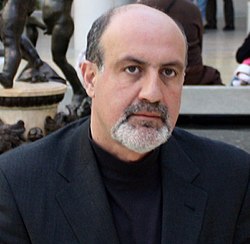Nassim Nicholas Taleb Quote
I AM NOT SO INTELLIGENT The epiphany I had in my career in randomness came when I understood that I was not intelligent enough, nor strong enough, to even try to fight my emotions. Besides, I believe that I need my emotions to formulate my ideas and get the energy to execute them. I am just intelligent enough to understand that I have a predisposition to be fooled by randomness—and to accept the fact that I am rather emotional. I am dominated by my emotions—but as an aesthete, I am happy about that fact. I am just like every single character whom I ridiculed in this book. Not only that, but I may be even worse than them because there may be a negative correlation between beliefs and behavior (recall Popper the man). The difference between me and those I ridicule is that I try to be aware of it. No matter how long I study and try to understand probability, my emotions will respond to a different set of calculations, those that my unintelligent genes want me to handle. If my brain can tell the difference between noise and signal, my heart cannot. Such unintelligent behavior does not just cover probability and randomness. I do not think I am reasonable enough to avoid getting angry when a discourteous driver blows his horn at me for being one nanosecond late after a traffic light turns green. I am fully aware that such anger is self-destructive and offers no benefit, and that if I were to develop anger for every idiot around me doing something of the sort, I would be long dead. These small daily emotions are not rational. But we need them to function properly. We are designed to respond to hostility with hostility. I have enough enemies to add some spice to my life, but I sometimes wish I had a few more (I rarely go to the movies and need the entertainment). Life would be unbearably bland if we had no enemies on whom to waste efforts and energy.
I AM NOT SO INTELLIGENT The epiphany I had in my career in randomness came when I understood that I was not intelligent enough, nor strong enough, to even try to fight my emotions. Besides, I believe that I need my emotions to formulate my ideas and get the energy to execute them. I am just intelligent enough to understand that I have a predisposition to be fooled by randomness—and to accept the fact that I am rather emotional. I am dominated by my emotions—but as an aesthete, I am happy about that fact. I am just like every single character whom I ridiculed in this book. Not only that, but I may be even worse than them because there may be a negative correlation between beliefs and behavior (recall Popper the man). The difference between me and those I ridicule is that I try to be aware of it. No matter how long I study and try to understand probability, my emotions will respond to a different set of calculations, those that my unintelligent genes want me to handle. If my brain can tell the difference between noise and signal, my heart cannot. Such unintelligent behavior does not just cover probability and randomness. I do not think I am reasonable enough to avoid getting angry when a discourteous driver blows his horn at me for being one nanosecond late after a traffic light turns green. I am fully aware that such anger is self-destructive and offers no benefit, and that if I were to develop anger for every idiot around me doing something of the sort, I would be long dead. These small daily emotions are not rational. But we need them to function properly. We are designed to respond to hostility with hostility. I have enough enemies to add some spice to my life, but I sometimes wish I had a few more (I rarely go to the movies and need the entertainment). Life would be unbearably bland if we had no enemies on whom to waste efforts and energy.
Related Quotes
About Nassim Nicholas Taleb
Taleb is the author of the Incerto, a five-volume work on the nature of uncertainty published between 2001 and 2018 (notably, The Black Swan and Antifragile). He has taught at several universities, serving as a Distinguished Professor of Risk Engineering at the New York University Tandon School of Engineering since September 2008. He has also been a practitioner of mathematical finance and is currently an adviser at Universa Investments. The Sunday Times described his 2007 book The Black Swan as one of the 12 most influential books since World War II.
Taleb criticized risk management methods used by the finance industry and warned about financial crises, subsequently profiting from the Black Monday (1987) and the 2008 financial crisis. He advocates what he calls a "black swan robust" society, meaning a society that can withstand difficult-to-predict events. He proposes what he has termed "antifragility" in systems; that is, an ability to benefit and grow from a certain class of random events, errors, and volatility, as well as "convex tinkering" as a method of scientific discovery, by which he means that decentralized experimentation outperforms directed research.
